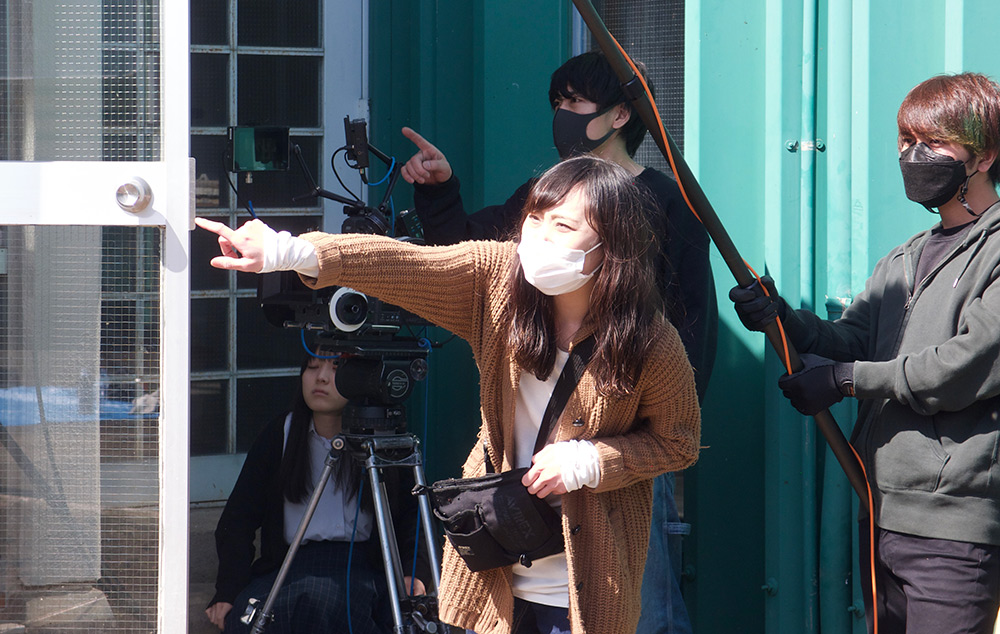![The new possibilities of visual expression hidden in 16mm film The challenge of the movie “Toki” [CINEMORE ACADEMY Vol.17]](https://cinemore.jp/images/d443e6ab51150f3acb05e8a3988ff6f62bc9c3014ab0eb89e7e447f90fe07f81.jpg)
(c)Movie "TOKI-" Executive Committee
The new possibilities of visual expression hidden in 16mm film The challenge of the movie “Toki” [CINEMORE ACADEMY Vol.17]
Film shooting not suitable for subjective images
Q: On the other hand, were there any inconveniences you faced while filming? If you feel there are any disadvantages, please let me know.
Tsukada (Director): Nowadays, there are fewer and fewer equipment stores that will rent out 16mm film cameras, and if this continues, rental costs may become expensive, which is a disadvantage. Also, unlike digital photography, we cannot import the images we take into our computers ourselves, so we have to have them developed first. It will be a problem if that developing laboratory (laboratory) does not operate for the next 10 years while filming ``Toki''. I'm also worried about the budget that will be incurred in the future due to the reduction in equipment and laboratories.
Q: Did you have any trouble directing it on set?
Tsukada (Director): I didn't. If it's digital, you can look back at it, but I don't want to look at it until it's fully developed. When I watch it back, I get the feeling that the live performance I saw on set changes a lot, so I don't like it that much.

(c)Movie "TOKI-" Executive Committee
Q: Were there any inconveniences as a cinematographer?
Haga (Director of Photography): As camera bodies are getting older, it is becoming difficult to check the focus through the viewfinder. Additionally, I'm worried that equipment stores are handling fewer and fewer camera bodies.
Also, this is just my personal opinion, but I feel that it is difficult to take subjective images with 16mm film. There are no "particles" in the scenery that humans see, and it is almost like watching a high-quality, beautiful digital image. 16mm film results in very grainy images, so even if I were to take a subjective video, I think it would just be the scenery seen through the camera lens or through the film.
Q: I see, 16mm film doesn't suit subjective images. This is the first time I've heard this opinion, but it's an interesting way of thinking.
Haga (Director of Photography): As a side note, when director David Fincher used to shoot on film, the images shown on the monitors on set were very grainy, but when you looked at them in rush mode, they turned out to be beautiful images, and I was impressed. Apparently, he did, but sometimes the images turned out to be worse than he had imagined, which caused him to distrust the technical staff. Therefore, Fincher switched to digital shooting from then on and began carefully checking the ``quality'' of the footage on set.
When you think about it that way, disadvantages are not necessarily disadvantages, and advantages can sometimes become disadvantages, so I get the impression that film is a very delicate scene.
Q: I also saw a documentary called ` `Side by Side: From Film to Digital Cinema '' (12), but in Fincher's case, he didn't switch from film to digital because of image quality or texture, but rather on-site. I decided to do it digitally because I could check the final image, and the reason for that was surprising and interesting.
Mr. Imai, did you feel any inconvenience?
Imai (Producer): When it comes to equipment, the number of equipment stores that carry it is certainly decreasing, but the rental cost itself is very low. It's much cheaper than the rental costs of digital cameras such as ALEXA and RED, so I think that part is actually an advantage. Apparently Darren Aronofsky's ` `Black Swan '' (2010) was also shot on 16mm film rather than digitally due to lack of budget.
"Black Swan" preview
There are many models of digital cameras, so if you don't care about ALEXA or RED, there are plenty of cheap cameras out there, but it's difficult to use them if you plan to release them in theaters. If you use a cheap digital camera and eliminate lighting, it will become cheaper and cheaper, but is that really a good idea?
What's important to me is not how to cut costs, but how to make something interesting and how director Tsukada can make what he wants to make, so I don't really see any disadvantages to using 16mm film.

